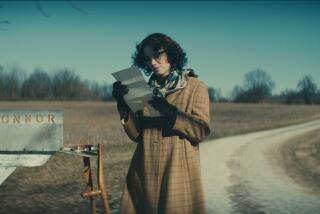A clearer, more compelling reality now that it’s reimagined
- Share via
Irish author Edna O’Brien left her tiny hamlet in County Clare more than a half-century ago, but the scenes and characters of those years still form the tapestry of every tale she tells. Her newest book, “The Light of Evening,” published last month, explores the painful but ultimately unbreakable relationship between a mother dying in Ireland and her absent, successful and sad globetrotting author-daughter. Dilly Macready, struck with ovarian cancer, lies in a hospital bed in Dublin, awaiting a visit from her estranged but beloved daughter Eleanora. Dilly is clearly based on O’Brien’s mother, Eleanora on O’Brien herself. Hermann, Eleanora’s oppressive and jealous husband, even seems eerily reminiscent of Ernest Gebler, the older Czech-Irish writer O’Brien herself married at 20. Crisscrossing America to promote her new book -- O’Brien appeared before a sold-out crowd in October at the Los Angeles Public Library -- O’Brien talked by phone about her choice to make “The Light of Evening” a novel rather than a memoir.
Hilary E. MacGregor
**
“A memoir would be a completely different work. The style would be limited, the range would be limited. In a memoir one would stick to the facts. A work of fiction is triggered by and inspired by things and people in my life, but there is greater scope and greater freedom. Hopefully there is a greater launching into the imagination. I wanted to write about my mother’s life as I reimagined it, because of course I didn’t know it. I wanted to counterpoint with Eleanora, who is partly myself but not utterly myself. I wanted to embody my mother’s letters....
“I don’t have a daughter. I think mothers are more indulgent of sons than daughters. The reason mothers and daughters have a more difficult relationship is that a mother identifies with a daughter, in a sense she wants to keep tabs on a daughter in a way she would not dare to with a son. I also believe daughters have a more dutiful feeling toward their mothers. The shadow of mother, be it good, middling or bad, is always there for a daughter, I believe. The relationship is never fully finished. Sons leave home and get married. Daughters leave home and get married, but a part of them remains in the family nest.
“My mother, God rest her, would say [the letters in the novel, from Dilly to Eleanora] are a bit of an embodiment between her and me. What I didn’t realize when I was receiving [letters from my mother] over the years, is how magical they were. They were really bulletins of her life, along with a deliberation to still hold onto me, not to let me go. They are full of story, description and longing. They have their element of control, of course. I think what you could say, is that they are love letters with qualifications.”
More to Read
Sign up for our Book Club newsletter
Get the latest news, events and more from the Los Angeles Times Book Club, and help us get L.A. reading and talking.
You may occasionally receive promotional content from the Los Angeles Times.










